|
|
| Sei in: Cinema e Medioevo ® Vampiria. Tutti i film sui vampiri ® I film in ordine alfabetico (1896-oggi) |

Chimères
2013, regia di Olivier Beguin
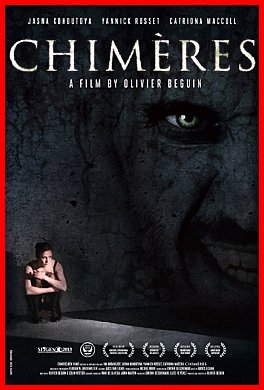

Scheda: Nazione: Svizzera - Produzione: Chaoticlock Films, VM Broadcast Services Global - Distribuzione: Ascot Elite Home Entertainment, Maritim Pictures - Soggetto: Olivier Beguin, Colin Vettier - Sceneggiatura: Olivier Beguin, Colin Vettier - Fotografia: Florian N. Gintenreiter - Montaggio: Olivier Beguin - Scenografia: Michel Imhof - Set Decoration: Cnn - Costumi: Alice Van Lierde - Musiche: Gisana Lorris - Formato: Color - Durata: 82'.
Cast: Jasna Kohoutova, Yannick Rosset, Catriona MacColl, Ruggero Deodato, Paulo dos Santos, Iván González, Sarah Marcuse, Yannick Merlin, Derek Robin.

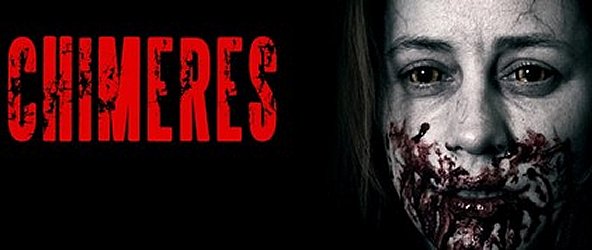


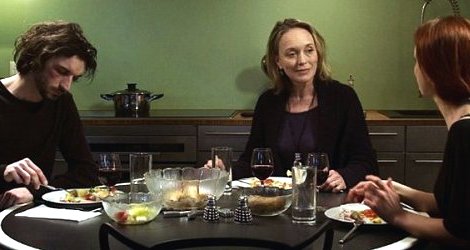
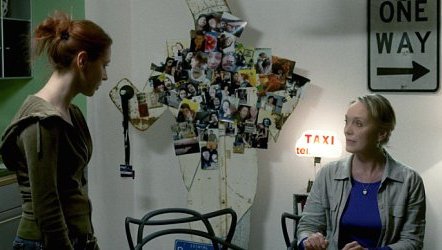
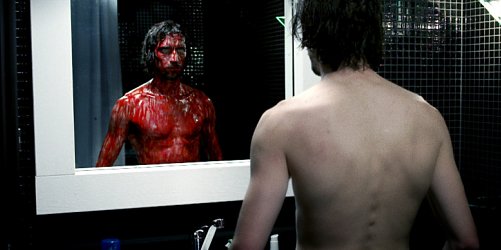



![]() Trama e commenti:
lascatoladelleidee.it -
cineuropa.org -
cineclandestino.it -
quinlan.it -
splattercontainer.com -
mymovies.it -
movieplayer.it: «Un'opera
sul vampirismo originale e apprezzabile, pur penalizzata da qualche incertezza
di sceneggiatura, che fa collidere le origini del mito con l'asettico contesto
di una città elvetica.. Durante una vacanza in Romania con la sua compagna
Livia, il fotografo Alexandre subisce un grave incidente: dopo una serata in cui
i due hanno alzato un po' il gomito, l'uomo viene investito da un'automobile,
riportando gravi traumi e ferite. I soccorsi non tardano, e Alexandre viene
curato con l'apporto fondamentale di una trasfusione di sangue. Al ritorno a
casa, però, per la coppia iniziano a manifestarsi i problemi: Alexandre è
affetto da un costante malessere, inizia a soffrire di allucinazioni e si rivela
inspiegabilmente fotofobico. Livia cerca dapprima di minimizzare la cosa, ma
quando Alexandre inizia a coprire con della plastica nera le finestre della
casa, capisce che il disagio del compagno è qualcosa di più di una passeggera
suggestione. Alexandre è convinto che la trasfusione subita in Romania abbia
infettato il suo sangue, trasformandolo in una creatura sovrannaturale. Le
allucinazioni, tutte incentrate sulla visione di un suo "doppio" malvagio,
iniziano a prendere il sopravvento sulla sua vita. La convivenza, per la giovane
coppia, si fa sempre più tesa; finché, suggestione o realtà, il malessere di
Alexandre non lo spinge a comportarsi coerentemente con quella che sente essere
la sua nuova natura...
Trama e commenti:
lascatoladelleidee.it -
cineuropa.org -
cineclandestino.it -
quinlan.it -
splattercontainer.com -
mymovies.it -
movieplayer.it: «Un'opera
sul vampirismo originale e apprezzabile, pur penalizzata da qualche incertezza
di sceneggiatura, che fa collidere le origini del mito con l'asettico contesto
di una città elvetica.. Durante una vacanza in Romania con la sua compagna
Livia, il fotografo Alexandre subisce un grave incidente: dopo una serata in cui
i due hanno alzato un po' il gomito, l'uomo viene investito da un'automobile,
riportando gravi traumi e ferite. I soccorsi non tardano, e Alexandre viene
curato con l'apporto fondamentale di una trasfusione di sangue. Al ritorno a
casa, però, per la coppia iniziano a manifestarsi i problemi: Alexandre è
affetto da un costante malessere, inizia a soffrire di allucinazioni e si rivela
inspiegabilmente fotofobico. Livia cerca dapprima di minimizzare la cosa, ma
quando Alexandre inizia a coprire con della plastica nera le finestre della
casa, capisce che il disagio del compagno è qualcosa di più di una passeggera
suggestione. Alexandre è convinto che la trasfusione subita in Romania abbia
infettato il suo sangue, trasformandolo in una creatura sovrannaturale. Le
allucinazioni, tutte incentrate sulla visione di un suo "doppio" malvagio,
iniziano a prendere il sopravvento sulla sua vita. La convivenza, per la giovane
coppia, si fa sempre più tesa; finché, suggestione o realtà, il malessere di
Alexandre non lo spinge a comportarsi coerentemente con quella che sente essere
la sua nuova natura...
Storia di vampiri elvetici. Esordio nel lungometraggio del regista Olivier Beguin, Chimères si rivela un interessante esempio di horror di produzione svizzera, che cerca di svecchiare, con uno sguardo originale, il tema del vampirismo. Compito, quest'ultimo, in realtà più difficile di quanto potesse risultare fino a qualche anno fa: perché, se è vero che la saga di Twilight e i suoi epigoni hanno consegnato il genere al teen movie e ai sospiri e languori di un pubblico adolescenziale, è anche vero che un capolavoro come lo svedese Lasciami entrare ha abbondantemente riequilibrato la situazione. Inoltre, in passato ci sono stati tanto George A. Romero (col suo Wampyr) quanto Kathryn Bigelow (con Il buio si avvicina) a trattare il tema da ottiche personali e originali; mentre, in tempi più recenti, Park Chan-Wook con Thirst ne ha offerto una lettura all'insegna di una debordante visionarietà. Se non ci si ferma al mainstream, quindi, i vampiri al cinema si difendono ancora più che bene, e risultano lontanissimi dagli ingessati non morti, mantello nero e volto esangue, chiusi nelle loro bare ad aspettare il tramonto, che l'iconografia ci ha tramandato. L'originalità del film di Beguin, tuttavia, sta nell'aver recuperato l'origine geografica del mito (la storia prende le mosse dalla vacanza dei due protagonisti in Romania) facendola collidere con un contesto asettico e ordinato, apparentemente quanto di più lontano dalle pulsioni del genere, come quello di una metropoli svizzera. ...» (Marco Minniti).
![]() Plot Summary, Synopsis, Review:
IMDb -
allmovie.com
-
fmvmagazine.com
-
cinemajam.com
-
cloneweb.net
-
nightmare-horrormovies.de
-
best-horror-movies.com:
«Chimères
is the first full-length film from Swiss director Olivier Beguin, who previously
wrote and directed a numbers of short films, mostly drama. In the pure genre of
body horror, the film features the progressive transformation of a normal man
into a monster. In that, Chimères immediately reminds of cult body horror films
such as The Fly or Ginger Snaps.
The first thing that strikes is how dark and beautiful the film is. With lots of
inventive shots such as the mirrors hallucinations or the photographic
self-portraits, an emphasis on the characters body and lengthy face close ups,
Chimères will surprise classic horror fans by its arty look. A superb work was
done on the texture and colours, Scenes such as the meat & blood diner, in which
the characters feast on raw meat, giblets and other bloody delicacy, are
striking and will not be forgotten easily. In that,
Chimères is
definitely not your usual brainless slaughtering flick.
Plot Summary, Synopsis, Review:
IMDb -
allmovie.com
-
fmvmagazine.com
-
cinemajam.com
-
cloneweb.net
-
nightmare-horrormovies.de
-
best-horror-movies.com:
«Chimères
is the first full-length film from Swiss director Olivier Beguin, who previously
wrote and directed a numbers of short films, mostly drama. In the pure genre of
body horror, the film features the progressive transformation of a normal man
into a monster. In that, Chimères immediately reminds of cult body horror films
such as The Fly or Ginger Snaps.
The first thing that strikes is how dark and beautiful the film is. With lots of
inventive shots such as the mirrors hallucinations or the photographic
self-portraits, an emphasis on the characters body and lengthy face close ups,
Chimères will surprise classic horror fans by its arty look. A superb work was
done on the texture and colours, Scenes such as the meat & blood diner, in which
the characters feast on raw meat, giblets and other bloody delicacy, are
striking and will not be forgotten easily. In that,
Chimères is
definitely not your usual brainless slaughtering flick.
As for the story, the film brings nothing new. The concept of a romance involving a vampire and an human forces the parallel with other romance/vampire films such as Tomas Alfredson’s Let The Right One In or Park Chan-Wook’s wonderful Thirst. The story of Chimeres is especially similar to Thirst in that it follows the descent into madness of a couple in which the guy was infected by a vampire. The present film stands the comparison with the latter two titles in terms of artistic beauty, but falls short when comparing the stories. Indeed, Chimères’ plot remains simple, with the storyline following the concept of the character going through all the classic changes that vampirism involves: teeth growth, thirst for blood, fear of the sun light, etc. It incorporates most of the classic rules of vampire mythology, sometimes making fun of itself by using some of these elements in a comical way, such as when the character’s wife is cutting garlic. For these reasons, those familiar with vampires films may find the scenario a little predictable and lacking surprises. Only in the last quarter of the film does the story, as well as with the action, really picks up to spice up this otherwise mono-dimensional scenario. ...» (Raoul).
Conosciuto anche con il titolo: Dreckiges Blut - Die Transfusion des Bösen.